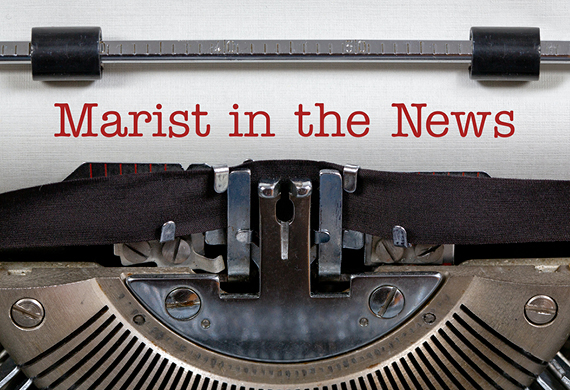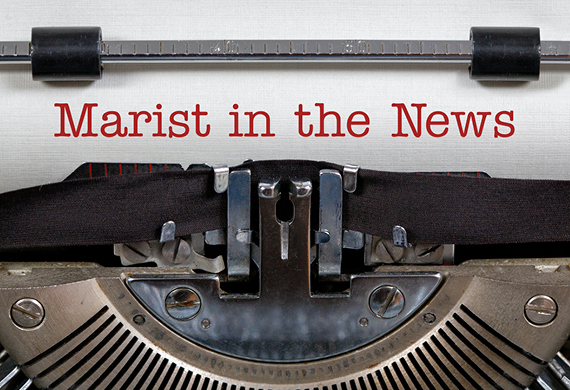Students from 20 Colleges Come to Marist to Compete in the Northeast Regional Ethics Bowl
Early on a Saturday morning in November, more than 100 students descended on Marist from 20 colleges and universities across the region. They were here for a marathon, 12-hour event: the Northeast Regional Ethics Bowl.
Teams comprised of five students compete, discussing and debating cases they receive early in the fall. Cases typically cover current issues. This year’s roster included: an examination of the television show “13 Reasons Why” and its potential impact on teen suicide; fake news; DNA testing of female athletes; and the Electoral College.
Marist has a long history of participating in ethics competitions thanks to Professor of Management Joanne Gavin, a specialist in business ethics. Every year she teaches the course “Ethical Decision Making in Business,” which is structured around fielding teams for the Northeast Regional Ethics Bowl, an event organized by the Association for Practical and Professional Ethics (APPE). Gavin has taken Marist teams to the National Ethics Bowl six times, and coaching the teams is something she is passionate about.
“My goal is to take students and stretch their minds and the way they think about things,” Gavin says. “I get tired of people laughing when I say my field is business ethics. These things are not mutually exclusive. What I’m doing in this course is trying to create ethical business leaders who understand there’s a right way and a wrong way to get to the bottom line.”
Students on the teams work extremely hard. They receive 15 cases in mid-September and have roughly two months to prepare. Students must learn about each one and become an expert in three; ultimately, at the competition, only 12 cases will be used.
Maura Sullivan ’18 participated for the third time this year. The senior, who’s majoring in finance and economics, credits the experience with improving her public speaking skills and building her confidence over time. “I was more confident this year. I even called out another team’s factual error—something I definitely would not have done before.”
This was the first Ethics Bowl for Sean Durkin ’19. “I grew not only as a student, but as a person,” he enthuses.
Both students agree that the interdisciplinary approach to the preparation process was rewarding. Students met with faculty members who are experts in the areas their cases covered. For a case on whether rivers in India and New Zealand should be granted personhood, Durkin and some classmates met with Andrew Ryder, Senior Lecturer in Environmental Science. “He poked holes in our arguments and gave us the counter view,” says Durkin.
Sullivan concurs, noting that Associate Professor of Philosophy James Snyder’s involvement was key—especially since the majority of students on the team are from the School of Management. “Because so many ethics teams are comprised of students who are philosophy majors, it was great to have a philosophy professor offer a different point of view on the issues we were exploring,” she explains. Sometimes the outcomes of these interactions really changed the course for the students: Sullivan said another faculty meeting completely changed her opinion on a case.
Other faculty involved included Chemistry and Physics Lecturer Lisa Stephens, Assistant Professor of Sociology Justin Myers, and Angel Arriaga of the Center for Multicultural Affairs.
This year, two Marist teams competed. The event pulled in alumni as well; some who participated in the Ethics Bowl as students returned as moderators. Nearly 40 community members served as judges. Marist Trustee Steve Effron delivered remarks at the opening plenary session. Effron’s talk touched on ethics in a variety of venues in his life, including meeting Nelson Mandela only a few months after his release from prison.
It was an inspiring day. “One judge remarked that there was no better way to spend a Saturday than listening to smart young people discuss important issues,” says Snyder, who’s also co-founder of the College’s Center for Ethics.
Other participating schools included Yale, West Point, Villanova, and James Madison University. Ultimately, the Tufts University team claimed victory.
“This is a monumental effort. Bringing 20 schools and nearly 40 judges to campus is a major undertaking,” explains co-founder of the Center for Ethics and Professor of English Moira Fitzgibbons. "But it’s worth it: this is an ideal event for Marist. Reflecting on meaningful issues is a big part of the life of the College; hosting the Ethic Bowl is perfect for the spirit of collaboration here."



